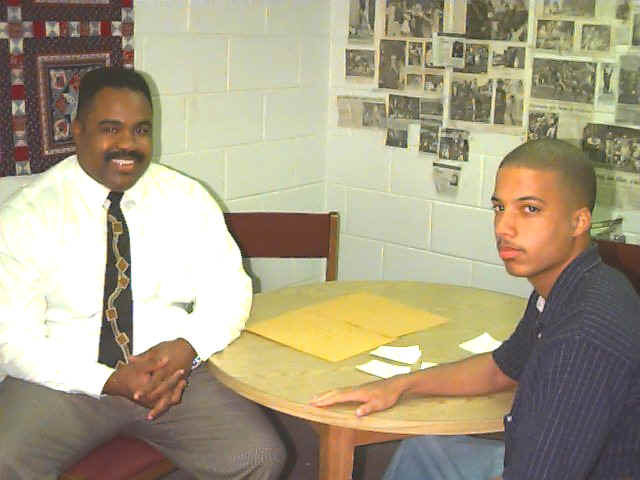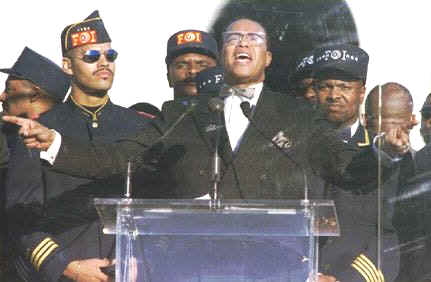
THE MILLION MAN MARCH
AN INTERVIEW WITH MR. MARK AUSBROOKS
BY GERARD HILL

Introduction
I am interviewing Mr. Mark Ausbrooks who is currently a Guidance Counselor here at Herndon High School on his experiences participating in the Million Man March.
The Million Man March was basically a mass gathering of black men with intentions of becoming better fathers, better husbands and more productive members of society. Factors that played a role in my choosing Mr. Ausbrooks were the fact that he grew up at the site of the Million Man March, Washington D.C. Growing up in D.C. enables Mr. Ausbrooks to offer some insight on the environment of the demonstration. Another factor is that Mr. Ausbrooks is an educated black man, which gave me (as a non-participant) the opportunity to benefit from his knowledge. A final factor was the fact that much of the March was overshadowed by people's negative misconceptions of the controversial Louis Farrakhan and I wanted to get Mr. Ausbrooks thoughts about Mr. Farrakhan.

Louis Farrakhan at the Million Man March
One of my goals in doing this interview is to bring about a new perspective or point of view. I want to make those with negative views of the March accountable for their views.
Interview
1. Given your opinion of the media, do you feel as though the media accurately portrayed the Million Man March?
No. The reason is that so often the media tries to define people and it seems as though the media tried to define Farrakhan as a leader of the black community. To me that is not accurate.
2. Given its focus on black men, how would you respond to the comparisons of the Million Man March to that of KKK rally?
The only similarity I can see is that the two both had a goal. The goal of the March was to make black men responsible in their communities. To also uplift others of the black population.
3. Do you feel black men had an obligation to attend?
As I observed it, some were forced to attend through peer pressure, but no, I don't think black men had an obligation to attend.
4. Would it be fair to say to those excluded from the event, such as whites and women, that if society wants me to become a better husband and a better father, then please allow me to first become one with myself before doing so?
I think so because you must first know and love yourself before you meet those expectations.
5. Thinking back to the civil rights movement, do you feel that the black race has become stagnated since then and the Million Man March was something that was overdue?
I think it is overdue because people were seeking wisdom and guidance that didn't exist during that time period. I can appreciate Mr. Farrakhan for somewhat restoring that.
6. Being the controversial figure that he is, what affect did Farrakahn have on the March?
He brought national attention to the Million Man March and I think he gained a sense of respect from those that up until the March doubted him.
7. How would you describe the Million Man March to a black man such as myself that didn't have the opportunity to attend?
I would say that it was a large gathering of black men that shared a lot of love. At no time did I feel in any way threatened or embarrassed by my surroundings.
8. Arthur Ashe once said "we have declined as a group exactly at the time we achieved the highest degree of freedom." Do you agree?
I agree because as a race I think that black people are sometimes hesitant to take advantage of the opportunities they are presented with. I'm not sure why that is, it could have something to do with our disciplining in terms of having that black leader in the community.
9. How do you feel about "nigga" being used as a slang term among black people?
I used to use it, that is until my mother made me realize the danger of the word. The way it was used was to basically degrade black people. That is the problem the fact that those who used the word just don't realize the ugliness of the word.
10. Do you feel that those who were in a position to do what could do to promote the March did enough? For example black actors and professional athletes?
What I thought was commendable was the fact that some NFL players took time off to attend the march as did basketball players. So having said that, then yes I think so.
11. If you were the coordinator of the march would there have been anything that you would have done differently?
Small things like more urinals, more free things. And I didn't particularly like the job they did with shutting down the city. I would have put more effort into that.
12. Given some peoples views of Farrakhan, do you think his participation in bringing together such a positive and peaceful demonstration maybe changed some of those views?
No. Those who hate him will continue to hate him, mainly because so much of what he has to say is taken out of context. People have the habit of seeing what's on the surface that they don't take the time out to try and understand, giving Farrakhan the reputation that he has.
13. As a follow-up to that last question, is some of what he says said "on purpose"?
Of course, he knows exactly what he is doing.
14. Was Spike Lee's film "Get on the Bus" an accurate depiction of the March?
I think so, it did a good job of focusing on an atmosphere of love and peace and the attitudes but also dealt with other issues.
15. Who do you feel is the leader of "black America"?
We don't have one. The media has played a big role in stating that frame of mind. Where we feel as though we need a leader when in fact that is not the case at all.
16. Black author Ralph Wiley was quoted as saying black people never give other blacks any praise and we choose to wait for the praise of whites. Do you agree?
Somewhat. I think there is a sense of self-hate among black people. It is like that cliche, if one crab reaches the top we want to pull him down.
17. Who is your role model?
William Burnette and Awilda Burnette, my grandparents.
18. Looking back on the March, are you satisfied with what has been done since then?
I think the demonstration definitely is a stepping stone in the direction I would not only want black men to head in, but the human race as a whole. So I would say yes, I am satisfied.
19. What's next?
I think we need more commitments such as the Million Man March. maybe more events to improve race relations. Once we can do that, then and only then will this world become a better place.
20. What do you feel you have personally do to improve the black race?
As a member of this faculty, I try to offer guidance and support to those who need it. I also try to stress education because some black people don't think that education is for them, which bothers me because knowledge is power and power is advancement.
Observation
The interview as a whole went real well. After interviewing Mr. Ausbrooks, I realized how little I actually knew about the Million Man March. I mean yes, we did review it earlier this year in class, but that doesn't compare to sitting in complete fascination and curiosity with someone who is a living part of history. What really intrigued me is the fact that going into this interview I tried to primarily focus my attention to the March. But given the interview with its excellent conversational tone, I found myself digressing on tangents that not only could have applied to the March but also applied to myself as a non-participant and as a young black man. To tell you the truth, sitting here trying to express my learning experience through words is becoming more of a challenge with every word. Curiosities I have had for years were assuaged with this interview. For instance, Mr. Ausbrooks described the setting as being very peaceful and a place he felt comfortable, whereas in other situations he may have had preconceived feelings of fear. To know that my feelings were shared with another black individual was something I found very reassuring. Reassuring in the sense that prior to this interview, I had this state of mind where I felt that I was just conceding to the stereotypical views co-existent in "white America." You see this in the very thing that will free our society from ignorance that currently suffocated it. This of course is knowledge. And so if the opportunity had not been presented to me in the form of this interview, my newly acquired knowledge may have never been attained. So in my particular situation, to categorize my enlightenment as merely an interview would be to diminish it to the point of insult.